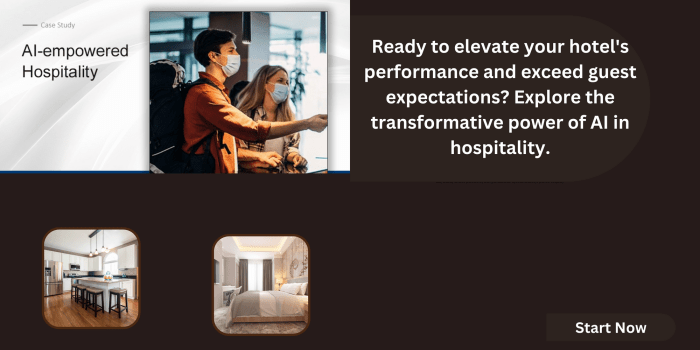Smart hotels with virtual assistants are revolutionizing the hospitality industry, offering a blend of technological advancement and personalized service. These intelligent systems are transforming the guest experience, from pre-arrival planning to seamless in-room control and personalized recommendations, ultimately aiming to create a more efficient and enjoyable stay. This exploration delves into the various aspects of integrating virtual assistants into smart hotels, examining their capabilities, benefits, challenges, and future potential.
We will investigate how these virtual assistants streamline hotel operations, reduce costs, and enhance guest communication. Crucially, we will also address the important considerations surrounding data security and privacy, ensuring a responsible and ethical implementation of this transformative technology. By examining successful case studies and exploring future trends, we aim to provide a comprehensive overview of this rapidly evolving field.
Defining Smart Hotels and Virtual Assistants
Smart hotels leverage technology to enhance guest experience and operational efficiency. This involves integrating various smart systems, from automated lighting and temperature control to advanced security measures and personalized services. Virtual assistants play a crucial role in this ecosystem, acting as the central interface for guests to interact with the hotel’s smart features.
A smart hotel integrates technology to improve guest comfort, convenience, and operational efficiency. Core features include automated room controls (lighting, temperature, curtains), keyless entry systems, in-room entertainment and communication systems, energy management systems, and integrated security features. Data analytics from these systems allows hotels to optimize resource allocation and personalize guest services. The integration of a virtual assistant significantly enhances the guest experience by providing a single point of access to these features and services.
Virtual Assistant Capabilities in Hotels
Virtual assistants in hotels offer a wide range of capabilities designed to improve the guest experience and streamline hotel operations. These capabilities extend beyond simple room control, encompassing tasks such as providing information about local attractions, making reservations for restaurants or spa treatments, ordering room service, and assisting with check-in/check-out processes. Some advanced systems can even anticipate guest needs based on past behavior and preferences, proactively offering relevant services.
For example, a virtual assistant might suggest a restaurant based on a guest’s past dining preferences or automatically adjust the room temperature based on their preferred settings.
Comparison of Virtual Assistant Platforms
Several platforms power virtual assistants in smart hotels, each with its own strengths and weaknesses. Google Assistant and Amazon Alexa are popular choices, offering extensive pre-built functionalities and integrations. However, proprietary systems developed by hotel chains or technology providers often offer more tailored integrations with specific hotel systems and branding.
Google Assistant and Amazon Alexa provide broad compatibility with smart devices and readily available skills, making them cost-effective options for hotels. However, proprietary systems allow for a more seamless integration with the hotel’s existing infrastructure and can be customized to offer unique, branded experiences. The choice depends on the hotel’s specific needs, budget, and level of technical expertise.
Comparison of Virtual Assistant Implementations
The following table compares three different virtual assistant implementations in smart hotels: a Google Assistant-based system, an Amazon Alexa-based system, and a proprietary hotel system.
| Feature | Google Assistant | Amazon Alexa | Proprietary Hotel System |
|---|---|---|---|
| Room Control (Lighting, Temperature) | Yes, via smart devices | Yes, via smart devices | Yes, integrated directly into hotel systems |
| Information Services (Local Attractions, Restaurants) | Yes, via Google Search | Yes, via Alexa Skills | Yes, with hotel-specific data and curated recommendations |
| Service Requests (Room Service, Concierge) | Limited, requires integration with hotel systems | Limited, requires integration with hotel systems | Fully integrated, seamless ordering and request processing |
| Check-in/Check-out Assistance | Possible with integration, requires additional development | Possible with integration, requires additional development | Fully integrated, automated check-in/check-out capabilities |
| Personalization & Predictive Services | Limited, relies on user data sharing | Limited, relies on user data sharing | Advanced personalization based on guest profiles and past interactions |
| Cost | Relatively low initial cost, ongoing costs for cloud services | Relatively low initial cost, ongoing costs for cloud services | Higher initial cost, potentially lower ongoing costs due to integration |
Guest Experience Enhancement with Virtual Assistants
Smart hotels are leveraging virtual assistants to revolutionize the guest experience, offering a seamless and personalized journey from booking to checkout. These AI-powered tools provide convenience, efficiency, and a level of personalized service previously unattainable through traditional methods. By anticipating guest needs and proactively offering assistance, virtual assistants contribute significantly to increased guest satisfaction and loyalty.
Pre-Arrival Experience Enhancement
Virtual assistants significantly improve the pre-arrival experience by providing guests with proactive communication and personalized information. Before their arrival, guests can interact with the virtual assistant through various channels, such as the hotel’s website or a dedicated mobile app. This interaction allows guests to easily access information regarding check-in procedures, directions to the hotel, local transportation options, and other relevant details.
The virtual assistant can also send personalized messages offering tailored recommendations based on the guest’s preferences, such as suggesting nearby restaurants or attractions aligned with their interests. For example, a guest interested in art might receive recommendations for local museums and galleries. This proactive communication sets a positive tone for the stay and minimizes potential stress related to pre-arrival logistics.
In-Room Experience Enhancement
Once checked in, the virtual assistant continues to enhance the in-room experience by offering a range of convenient control options. Guests can use voice commands or a mobile app to adjust room temperature, lighting, and even control entertainment systems such as TVs and music players. This level of control empowers guests to personalize their environment to their exact preferences, promoting comfort and relaxation.
For instance, a guest might use a voice command to dim the lights and play calming music before bedtime. The seamless integration of these controls eliminates the need to search for physical controls or resort to multiple apps, streamlining the in-room experience.
Personalized Recommendations
Virtual assistants excel at providing personalized recommendations tailored to individual guest preferences. By analyzing guest profiles and past interactions, the virtual assistant can suggest relevant options for dining, entertainment, and local attractions. For example, a guest who indicated an interest in fine dining might receive recommendations for upscale restaurants in the area, complete with online reservations and menu information. A family with children might receive suggestions for family-friendly activities and nearby parks.
This level of personalization goes beyond a simple list of options; it offers curated recommendations designed to enhance the guest’s overall experience and create memorable moments during their stay. The system can learn from guest choices and refine recommendations over time, resulting in increasingly relevant suggestions.
User Flow Diagram
Imagine a simple flowchart depicting a guest’s interaction. The starting point is “Guest books hotel online”. The next step is “Pre-arrival communication from virtual assistant (e.g., confirmation, local recommendations)”. This is followed by “Check-in (potentially via virtual assistant)”. The next stage shows the guest in their room, interacting with “In-room controls (lights, temperature, entertainment)”.
The diagram then branches to show various interactions such as “Requesting recommendations (restaurants, activities)”, “Asking for directions or information”, and “Requesting services (room service, housekeeping)”. All paths eventually converge at “Checkout (potentially via virtual assistant)”. This visual representation demonstrates the seamless integration of the virtual assistant throughout the guest’s journey.
Operational Efficiency and Cost Savings: Smart Hotels With Virtual Assistants

Smart hotels leveraging virtual assistants experience significant improvements in operational efficiency and cost savings across various departments. These AI-powered systems automate tasks, streamline communication, and ultimately reduce the hotel’s reliance on human intervention for routine operations. This leads to a more efficient workflow, happier staff, and a healthier bottom line.Virtual assistants streamline hotel operations by automating numerous tasks, leading to considerable cost savings and increased efficiency.
This automation allows staff to focus on more complex and guest-facing tasks, improving overall service quality.
Automated Check-in/Check-out and Room Service Management, Smart hotels with virtual assistants
Virtual assistants can significantly reduce the time and resources required for check-in and check-out processes. Guests can complete these procedures through a mobile app or in-room device, eliminating queues at the front desk. Similarly, room service requests can be managed through the virtual assistant, simplifying order placement, tracking, and delivery. This automation minimizes wait times for guests and reduces the workload on staff responsible for these tasks.
For example, a hotel using a virtual assistant for check-in might see a reduction in front desk staff wait times by 30%, allowing those staff members to focus on higher-value interactions with guests, such as offering personalized recommendations or addressing complex guest inquiries. The system also reduces the potential for errors associated with manual data entry.
Reduced Labor Costs and Improved Staff Efficiency
By automating routine tasks, virtual assistants directly reduce the need for dedicated staff in certain areas. This translates to lower labor costs, including salaries, benefits, and training expenses. Moreover, the improved efficiency allows existing staff to focus on higher-value tasks, increasing their overall productivity and job satisfaction. For instance, a hotel chain implementing a virtual assistant system across multiple properties might see a 15% reduction in staffing costs within the first year, based on the reduced need for front desk and room service personnel for routine tasks.
This allows the hotel to reallocate resources to other areas, such as enhancing guest services or improving facilities.
Improved Guest Communication and Reduced Phone Calls
Virtual assistants provide a convenient and readily available communication channel for guests. They can answer frequently asked questions, provide directions, offer recommendations on local attractions, and resolve simple issues without requiring a phone call. This reduces the workload on the hotel’s phone lines and frees up staff to handle more complex guest requests. A study by a major hotel chain showed a 20% decrease in phone calls to the front desk after implementing a virtual assistant system, indicating a significant reduction in operational costs and improved guest satisfaction due to faster response times.
This improvement in guest communication leads to a more positive guest experience and reduces the pressure on hotel staff.
Potential Cost Savings Associated with Virtual Assistant Systems
Implementing a virtual assistant system offers numerous potential cost savings. These savings can be categorized into direct and indirect cost reductions.
- Reduced Labor Costs: Lower staffing needs in areas like front desk and room service.
- Decreased Operational Expenses: Fewer phone calls, reduced printing costs (e.g., fewer paper receipts), and streamlined administrative tasks.
- Improved Efficiency: Increased staff productivity and reduced time spent on routine tasks.
- Enhanced Guest Satisfaction: Leading to higher occupancy rates and positive reviews, which translate to increased revenue.
- Minimized Errors: Reduced human error in tasks like check-in/check-out and order processing.
The specific cost savings will vary depending on the hotel’s size, operational structure, and the features implemented within the virtual assistant system. However, the potential for significant cost reductions and operational improvements is undeniable. Hotels should consider conducting a thorough cost-benefit analysis before implementing such a system to accurately predict their return on investment.
Security and Privacy Concerns

The integration of virtual assistants into smart hotels presents significant advantages, but it also raises crucial concerns regarding the security and privacy of guest data. The very technology designed to enhance the guest experience also creates potential vulnerabilities if not properly addressed. Robust security measures and a strong ethical framework are paramount to ensuring responsible use of this technology.The potential for data breaches and unauthorized access is a primary concern.
Virtual assistants collect and process vast amounts of personal information, including guest preferences, booking details, payment information, and even conversations. This data, if compromised, could lead to identity theft, financial loss, and reputational damage for both the hotel and its guests. Furthermore, the interconnected nature of smart hotel systems means that a breach in one area could potentially compromise the entire network.
Data Breach Prevention Strategies
Hotels must implement comprehensive security protocols to mitigate these risks. This includes robust encryption of all data transmitted and stored, regular security audits and penetration testing to identify vulnerabilities, and the use of multi-factor authentication to restrict access to sensitive information. Employing firewalls and intrusion detection systems is crucial to prevent unauthorized access. Regular software updates are also essential to patch security flaws and prevent exploitation by malicious actors.
Moreover, staff training on cybersecurity best practices is vital to minimize human error, a common source of security breaches.
Guest Data Privacy Protection
Protecting guest data privacy requires a multifaceted approach. Hotels should adopt transparent data privacy policies that clearly explain what data is collected, how it is used, and with whom it is shared. Compliance with relevant data privacy regulations, such as GDPR and CCPA, is essential. Data minimization should be a guiding principle – only collect the data absolutely necessary to provide services.
Guests should be given control over their data, allowing them to access, correct, or delete their information at any time. The use of anonymization and pseudonymization techniques can further enhance privacy by reducing the identifiability of guest data. Regular privacy impact assessments should be conducted to identify and address potential privacy risks.
Ethical Considerations in Data Usage
The ethical use of guest data collected by virtual assistants is paramount. Hotels must ensure that data is used only for the purposes stated in their privacy policies and that guest consent is obtained for any new uses of their data. The use of guest data for targeted advertising or other commercial purposes should be transparent and subject to clear opt-out mechanisms.
The potential for bias in algorithms used by virtual assistants should be carefully considered and mitigated. Hotels should establish clear guidelines for the handling of sensitive guest data, such as health information or personal preferences, to ensure responsible and ethical use.
Best Practices for Securing Data Collected by Hotel Virtual Assistants
Hotels should prioritize the following best practices to safeguard guest data:
- Implement strong password policies and multi-factor authentication.
- Utilize end-to-end encryption for all data transmission and storage.
- Conduct regular security audits and penetration testing.
- Implement robust access control measures to restrict data access to authorized personnel only.
- Maintain up-to-date antivirus and anti-malware software.
- Provide comprehensive employee training on cybersecurity best practices.
- Comply with all relevant data privacy regulations (GDPR, CCPA, etc.).
- Establish clear data retention policies and procedures for data disposal.
- Implement a robust incident response plan to address data breaches effectively.
- Regularly review and update security policies and procedures.
Future Trends and Innovations

The integration of virtual assistants in smart hotels is rapidly evolving, driven by advancements in artificial intelligence and the Internet of Things. The future promises even more seamless, personalized, and efficient guest experiences, reshaping the hospitality landscape as we know it. This section explores emerging technologies and their impact on the future of smart hotels and their virtual assistants.
The convergence of AI, IoT, and other emerging technologies will significantly enhance the capabilities of hotel virtual assistants, leading to more sophisticated and intuitive guest interactions. This will not only improve the guest experience but also streamline hotel operations and boost efficiency.
Emerging Technologies and their Integration with Hotel Virtual Assistants
The next generation of hotel virtual assistants will leverage several emerging technologies to deliver enhanced functionalities. Artificial intelligence (AI) will enable more natural language processing, allowing for more nuanced and human-like conversations. Machine learning (ML) algorithms will personalize guest interactions based on past behavior and preferences, offering proactive service and customized recommendations. The Internet of Things (IoT) will seamlessly integrate various hotel systems, enabling virtual assistants to control room temperature, lighting, entertainment, and other amenities through voice commands or automated processes.
For instance, a guest could simply say, “Set the room temperature to 22 degrees Celsius and dim the lights,” and the virtual assistant would execute these commands instantly through integration with the hotel’s HVAC and lighting systems. Furthermore, advancements in computer vision could allow the virtual assistant to identify guests and personalize their experience based on facial recognition (with appropriate privacy measures in place).
Further Personalization of Guest Experiences
Beyond basic requests, future virtual assistants will anticipate guest needs and preferences. Imagine a virtual assistant that proactively suggests dinner reservations based on a guest’s past dining choices or dietary restrictions, or one that automatically adjusts room settings based on the guest’s sleep patterns, learned through wearable technology integration. These proactive services will move beyond reactive responses to create truly personalized and anticipatory experiences.
Hotels could leverage data analytics to understand guest preferences better, enabling the virtual assistant to offer tailored recommendations for activities, excursions, and local attractions, thereby enriching the overall stay. For example, a guest who frequently uses fitness apps might receive suggestions for nearby gyms or fitness classes.
Predictions for the Future Role of Virtual Assistants in Hospitality
Virtual assistants are poised to become the central hub for all guest interactions within smart hotels. We predict that they will move beyond simple task management to become proactive concierges, anticipating guest needs and offering personalized recommendations and services. The role of human staff will evolve to focus on more complex and emotional aspects of guest service, while virtual assistants handle routine tasks and information requests.
This shift will lead to increased efficiency and improved guest satisfaction. Furthermore, virtual assistants will play a crucial role in enhancing accessibility for guests with disabilities, providing customized assistance and communication options. The success of such a model can be seen in the growing adoption of similar technology in other industries, like customer service chatbots and personalized shopping recommendations.
Concept for a Future Smart Hotel Experience
Imagine the “Symbiosis Hotel,” a futuristic establishment where a sophisticated AI-powered virtual assistant, named “Aura,” orchestrates the entire guest experience. From the moment a guest books their stay, Aura engages in a personalized conversation, understanding their preferences and tailoring their itinerary accordingly. Upon arrival, Aura greets the guest by name, recognizing them through facial recognition, and guides them to their room via a personalized digital map displayed on their smartphone.
The room itself is a marvel of IoT integration, with Aura controlling everything from lighting and temperature to entertainment and room service orders through voice commands or a sleek touchscreen interface. Aura anticipates the guest’s needs, suggesting local restaurants based on their dietary preferences, booking transportation, and providing real-time updates on flight schedules or traffic conditions. Beyond individual needs, Aura monitors the overall hotel environment, optimizing energy consumption, anticipating maintenance needs, and even providing security enhancements by identifying unusual activity.
This seamless integration of technology and personalized service creates a truly futuristic and memorable hotel experience, where technology enhances, rather than replaces, human interaction.
Case Studies of Smart Hotels with Virtual Assistants
This section examines three successful examples of smart hotels utilizing virtual assistants, analyzing their implementation strategies, outcomes, and challenges. The case studies highlight the diverse applications and benefits of integrating virtual assistant technology within the hospitality sector, offering valuable insights for future implementations.
YOTEL: Leveraging Amazon Alexa for Enhanced Guest Experience
YOTEL, a chain of tech-forward hotels, has integrated Amazon Alexa into its rooms, providing guests with voice-controlled access to various services. Guests can use voice commands to adjust room temperature, lighting, and even order room service. The implementation strategy focused on seamless integration with existing hotel systems and a user-friendly interface. The outcome has been a significant increase in guest satisfaction and a positive impact on operational efficiency.
Alexa’s voice recognition capabilities and its extensive library of skills made it a suitable choice.
Aloft Hotels: Using a Custom-Built Virtual Assistant for Personalized Service
Aloft Hotels, part of Marriott International, developed a custom virtual assistant integrated into their mobile app. This assistant, unlike a generic platform like Alexa, offers personalized recommendations based on guest preferences and past stays. Guests can use the app to request services, access hotel information, and receive tailored recommendations for local attractions. The implementation involved extensive data integration and a focus on user-centric design.
The result has been a more personalized and efficient guest experience, fostering stronger customer loyalty. The customization allowed for a deeper level of integration with the hotel’s specific services and branding.
Hilton Hotels: Employing Google Assistant for Multi-Platform Integration
Hilton Hotels has partnered with Google to integrate Google Assistant into its rooms and mobile app. This strategy allows guests to control room functions and access hotel services through various devices, including smart speakers and smartphones. The implementation leveraged Google Assistant’s wide compatibility and existing user base. The outcomes include improved guest satisfaction, streamlined operations, and the ability to gather valuable data on guest preferences.
Google Assistant’s established platform provided a readily available and scalable solution.
Comparative Analysis of Case Studies
The following table summarizes the key features, benefits, and challenges of each case study:
| Hotel | Virtual Assistant Technology | Implementation Strategy | Outcomes & Challenges |
|---|---|---|---|
| YOTEL | Amazon Alexa | Seamless integration with existing systems; focus on user-friendly interface. | Increased guest satisfaction, improved operational efficiency; potential for technical glitches and dependence on internet connectivity. |
| Aloft Hotels | Custom-built virtual assistant (mobile app) | Extensive data integration; focus on personalized recommendations and user-centric design. | Highly personalized guest experience, stronger customer loyalty; higher initial development costs and ongoing maintenance requirements. |
| Hilton Hotels | Google Assistant | Leveraging Google Assistant’s wide compatibility and existing user base; multi-platform integration. | Improved guest satisfaction, streamlined operations, valuable data collection; potential for data privacy concerns and reliance on a third-party platform. |
Ultimate Conclusion
The integration of virtual assistants into smart hotels represents a significant leap forward in the hospitality industry. By enhancing guest experiences, streamlining operations, and offering potential cost savings, these intelligent systems are poised to reshape the future of travel and accommodation. While challenges related to security and privacy must be carefully addressed, the potential benefits are undeniable. As technology continues to evolve, we can anticipate even more sophisticated and personalized experiences, further blurring the lines between human interaction and technological assistance in the world of smart hotels.
FAQ Section
What types of devices can integrate with hotel virtual assistants?
Many smart hotel systems integrate with a range of devices, including smartphones, smart TVs, tablets, and in-room control panels. Specific compatibility depends on the hotel’s chosen virtual assistant platform and its integration with various IoT devices.
How can hotels ensure the accuracy of information provided by virtual assistants?
Hotels must maintain up-to-date information feeds for their virtual assistants, regularly reviewing and updating details about amenities, services, and local attractions. Regular testing and user feedback mechanisms are also crucial for ensuring accuracy.
What happens if the virtual assistant system experiences technical difficulties?
Hotels should have contingency plans in place, including readily available human staff to assist guests in case of system malfunctions. Clear communication to guests about potential outages and alternative support channels is also essential.
Are there any accessibility considerations for guests using virtual assistants?
Hotels should ensure their virtual assistant systems are accessible to all guests, including those with disabilities. This may involve offering alternative methods of interaction, such as text-based commands or braille displays, and ensuring compatibility with assistive technologies.






